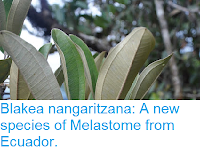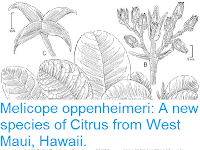Bush Cherries, Syzygium spp., are evergreen trees and shrubs in the Myrtle Family, Mytaceae, found across Africa, South and Southeast Asia, Indonesia and Australia. Over a thousand species of these plants have been described, with almost 200 from New Guinea, though this is thought to represent only a fraction of the group's diversity on the island, many areas of which have been subject to only limited surveys by botanists.
In a paper published in the Gardens' Bulletin Singapore on 20 November 2017, Greg Hambali of the Taman Buah Mekarsari and the Yatazawa R & D Gardens, Sri Sunarti of the Herbarium Bogoriense of the Indonesian Institute of Science, and Yee Wen Low of the Herbarium at Singapore Botanic Gardens, Comparative Plant and Fungal Biology at the Royal Botanic Gardens Kew, and the School of Biological Sciences at the University of Aberdeen, describe a new species of Bush Cherry from Papua Province, Indonesian New Guinea.
The new species is named Syzygium jiewhoei, in honour of Tan Jiew Hoe for his great interest in natural history, particularly in the fields of botany and horticulture. It is a tree reaching 9 m in height with grayish-brown, papery, peeling bark, and leaves that reach 105 cm in length and 25 cm in width. It produces clumps of up to 250 white flowers directly from the trunk of the tree, the fruit are ellipsoid in shape, grooved, salmon-pink in colour, and sour tasting.
Syzygium jiewhoei. (A) Young leaves. (B) Cauliflorous habit with many inflorescences at various stages. (C) Close-up of inflorescences showing flowers at anthesis. (D) Close-up of infructescence. Greg Hambail in Hambali et al. (2017).
The species has been found in the wild only around Timika in Papua Province, however it has been introduced as a cultivated tree in Singapore and Java, and appears to be prospering in both places.
See also...
Follow Sciency Thoughts on Facebook.







